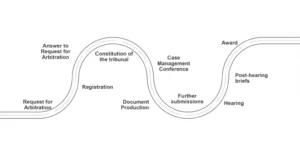Arbitration is a popular method of dispute resolution, offering a private and efficient alternative to traditional court proceedings. This guide provides an introduction to arbitration, covering its definition, process, enforcement, costs, and addressing some of its specificities in Germany.
1. What is arbitration?
Arbitration is a method of resolving disputes outside of court, where the parties involved appoint one or more arbitrators to make a binding decision. The arbitrators’ decision, known as the award, is final and enforceable.
There are two main types of arbitration:
- Ad-hoc arbitration: The parties and arbitrators manage the process themselves.
- Institutional arbitration: An established institution with a set of rules and procedures oversees the process.
Pros and cons of arbitration:
- Pros: Confidentiality, flexibility, and typically faster resolution.
- Cons: Potentially higher costs and lack of formal appeal mechanisms.
2. What are the requirements to initiate an arbitration?
Parties can only proceed to arbitration if they have a prior agreement to do so. This agreement, often included as a clause in a contract, stipulates that any disputes arising from the contract will be resolved through arbitration rather than through the civil court system. This means that once parties agree to arbitration, they waive their right to take the dispute to a civil court.
Exemplary Arbitration Clauses:
ICC Model Clause:
All disputes arising out of or in connection with the present contract shall be submitted to the International Court of Arbitration of the International Chamber of Commerce and shall be finally settled under the Rules of Arbitration of the International Chamber of Commerce by one or more arbitrators appointed in accordance with the said Rules. The seat of arbitration is [Berlin / Munich / Frankfurt / Hamburg / Cologne]. The language of arbitration shall be [language].
DIS Model Clause:
(1) All disputes arising out of or in connection with this contract or its validity shall be finally settled in accordance with the Arbitration Rules of the German Arbitration Institute (DIS) without recourse to the ordinary courts of law.
(2) The arbitral tribunal shall be comprised of [a sole arbitrator/ three members].
(3) The seat of the arbitration is [Berlin / Munich / Frankfurt / Hamburg / Cologne].
(4) The language of the arbitration shall be [please enter language of the arbitration].
(5) The rules of law applicable to the merits shall be [please enter law or rules of law].
3. How does arbitration work?
The arbitration process typically follows the following steps:

- Request for arbitration: The claimant initiates the arbitration by outlining the issues in dispute.
- Registration of the claim: The arbitration institution acknowledges receipt of the request and registers the claim, ensuring it complies with procedural requirements and assigning a case number.
- Answer to request for arbitration: The respondent submits an answer to the request, stating their position on the issues raised and potentially including any counterclaims.
- Constitution of the tribunal: Each party appoints one co-arbitrator, and the co-arbitrators nominate the presiding arbitrator.
- Case management conference: A conference is held to agree on basic terms, the course of the proceeding, and the procedural calendar.
- Document production: Although not standard in Germany, parties may sometimes request each other to produce relevant documents. The tribunal makes a ruling the documents to be produced.
- Written submissions: Parties submit their arguments in writing, including all the relevant evidence.
- Hearing: The tribunal conducts a hearing to take evidence, which can range from one day to several weeks depending on the complexity of the case.
- Post-hearing briefs and cost submissions: Parties often submit further written arguments and statements of their costs after the hearing.
- Award: The tribunal delivers its decision in the form of an award.
4. How can awards be enforced?
Arbitral awards can be enforced under the New York Convention, to which Germany and 171 other States are signatories. This international treaty ensures the recognition and enforcement of foreign arbitral awards by the courts of the signatory states.
Under German law, the enforcement (and annulment) of arbitral awards is governed by Sec. 1059-1065 of the German Civil Code (Zivilprozessordnung; ZPO).
5. How expensive is arbitration?
The costs of arbitration can vary widely, depending on factors such as the complexity of the case and the institution administering the arbitration. Arbitration tends to be more expensive than a single instance of court litigation but cheaper compared to multiple instances of litigation. It is also typically faster.
While tribunals enjoy wide discretion as to the allocation of costs, costs in German proceedings typically “follow the event”, i.e. the winner takes it all (see, e.g. Art. 33 (3) of the 2018 DIS Rules). This means that a successful party can usually claim its legal costs and expenses from its opponent.
6. What is special about arbitration in Germany?
Arbitration proceedings in Germany are governed by the German Arbitration Act (contained in the 10th book of the German Civil Code, Sec. 1025 et seqq.). While the German Arbitration Act stipulates only a few mandatory rules, it can be observed that German practitioners (both counsel and arbitrators) tend to conduct arbitration proceedings similarly to German court proceedings. Despite many differences, arbitration proceedings in Germany tend to apply similar pleading standards as in civil procedure, avoid document production, and leave the tribunal primarily in charge of taking evidence (including questioning witnesses). Consequently, it is usually recommendable to be represented by counsel who are familiar with the ins and outs of German proceedings.
In Germany, arbitrations are primarily administered by the German Institution of Arbitration (DIS) or the International Chamber of Commerce (ICC). Other institutions like the Stockholm Chamber of Commerce (SCC), the London Court of International Arbitration (LCIA), the Hong Kong International Arbitration Centre (HKIAC), the Swiss Arbitration Centre and the Vienna International Arbitral Centre (VIAC) are also used. Additionally, many regional chambers of commerce (Industrie- und Handelskammer) offer their services as arbitration institutions on a regional level. Arbitration in Germany is known for its reliability and efficiency, making it an attractive option for international clients with connections to Germany.
Conclusion
We hope this blog post has provided you with a useful overview of the main features and benefits of arbitration in Germany. If you have any questions or need assistance regarding arbitration, please do not hesitate to contact us.
For more information about our arbitration experience, please visit our website.

